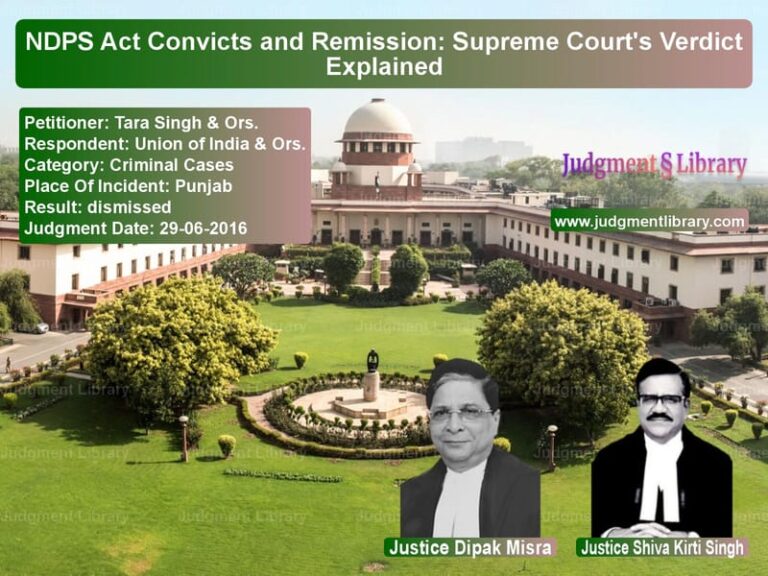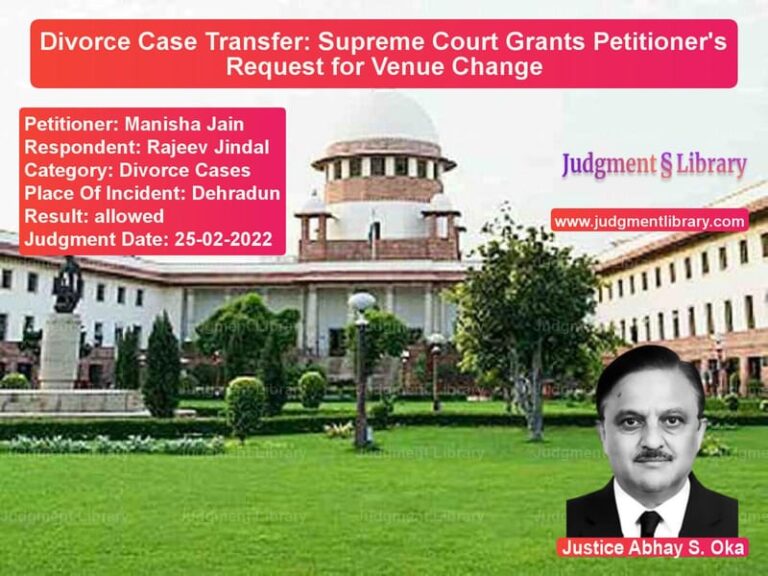Child Custody and Contempt: Supreme Court’s Ruling on International Parental Abduction
The case of Meenal Bhargava v. Naveen Sharma is a complex legal battle involving international child custody, contempt of court, and enforcement of foreign court orders. The Supreme Court had to determine whether the mother, who had taken the child from Canada to India without the father’s consent, was in contempt of court for failing to adhere to a mediated settlement requiring her return to the United States with the child.
Background of the Case
The dispute arose after the marriage of Meenal Bhargava and Naveen Sharma in 2007. The couple initially lived in the United States and later migrated to Canada. Their child, Pranav, was born in 2009 in Baltimore, USA. However, due to marital discord, Meenal left her husband in July 2013, taking Pranav with her to India.
In 2014, Naveen Sharma approached a Canadian court for custody of the child. The court granted him temporary custody, but by then, Meenal had already moved to India with Pranav. The Canadian court subsequently issued an order in 2015 directing Meenal to return Pranav to its jurisdiction. When she failed to comply, an Interpol red corner notice was issued against her.
Naveen Sharma then filed a Habeas Corpus petition in the Rajasthan High Court, seeking the return of Pranav. The High Court referred the case for mediation, and a settlement was reached in December 2015, wherein Meenal agreed to return to the United States with Pranav and live with Naveen. However, she later refused to comply with the settlement terms, leading to a contempt petition being filed by Naveen in the High Court.
Key Legal Issues
- Whether Meenal Bhargava was in contempt of court for failing to comply with the settlement agreement and High Court orders.
- Whether an Indian court could enforce a foreign custody order.
- Whether Meenal’s refusal to return to the United States with Pranav justified imposing civil imprisonment for contempt.
Arguments by the Petitioner (Naveen Sharma)
Naveen Sharma contended that:
- Meenal had willfully breached the mediated settlement agreement recorded by the Rajasthan High Court.
- Despite withdrawing cases against her and fulfilling his obligations, she refused to return to the United States.
- She had not allowed him access to Pranav despite repeated attempts.
- Her actions amounted to contempt of court as she defied the High Court’s directive to adhere to the settlement terms.
Arguments by the Respondent (Meenal Bhargava)
Meenal Bhargava defended her actions by arguing that:
- The settlement agreement had become unenforceable due to Naveen’s failure to ensure the withdrawal of the Canadian custody case.
- She feared arrest upon her return to the United States due to pending legal actions.
- Her child’s welfare was best protected in India.
- She had attempted to comply with the settlement in good faith but was misled by Naveen’s assurances.
Supreme Court’s Observations
The Supreme Court noted the complexities of international child custody disputes and the need for courts to prioritize the child’s welfare. The Court stated:
“The paramount consideration in custody cases is the welfare of the child. A parent cannot be permitted to unilaterally take the child to another jurisdiction and then use that as a ground to retain custody.”
On the issue of contempt, the Court emphasized:
“A consent order must be adhered to in good faith. If a party enters into an agreement and later reneges on it without valid justification, it amounts to contempt.”
Final Judgment
The Supreme Court ruled that:
- Meenal Bhargava was in contempt of court for failing to comply with the High Court’s settlement order.
- The High Court erred in imposing civil imprisonment without properly examining whether Meenal’s concerns regarding arrest in the United States were valid.
- The contempt order was set aside, but the Habeas Corpus petition was restored for fresh adjudication on custody issues.
- The High Court was directed to prioritize Pranav’s welfare while deciding custody.
Implications of the Judgment
The ruling has significant implications for cross-border custody disputes:
- It reinforces that consent orders must be honored and non-compliance can attract contempt proceedings.
- It clarifies that a parent cannot use self-created circumstances to justify disobedience of court orders.
- It highlights the importance of determining the best interests of the child in international custody disputes.
Conclusion
The Supreme Court’s decision in Meenal Bhargava v. Naveen Sharma provides clarity on enforcement of custody agreements and contempt proceedings in family disputes. By balancing legal obligations with the child’s welfare, the ruling ensures that custody battles are resolved in a manner that serves the child’s best interests while upholding the integrity of court orders.
Petitioner Name: Naveen Sharma.Respondent Name: Meenal Bhargava.Judgment By: Justice A.K. Sikri, Justice Ashok Bhushan.Place Of Incident: Canada/India.Judgment Date: 09-05-2018.
Don’t miss out on the full details! Download the complete judgment in PDF format below and gain valuable insights instantly!
Download Judgment: Naveen Sharma vs Meenal Bhargava Supreme Court of India Judgment Dated 09-05-2018.pdf
Direct Downlaod Judgment: Direct downlaod this Judgment
See all petitions in Child Custody
See all petitions in Divorce by Desertion
See all petitions in Alimony and Maintenance
See all petitions in Judgment by A.K. Sikri
See all petitions in Judgment by Ashok Bhushan
See all petitions in partially allowed
See all petitions in Remanded
See all petitions in supreme court of India judgments May 2018
See all petitions in 2018 judgments
See all posts in Divorce Cases Category
See all allowed petitions in Divorce Cases Category
See all Dismissed petitions in Divorce Cases Category
See all partially allowed petitions in Divorce Cases Category







